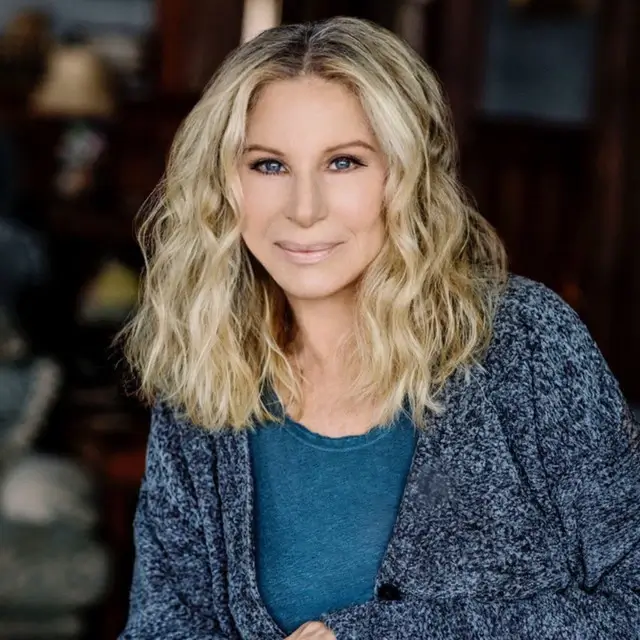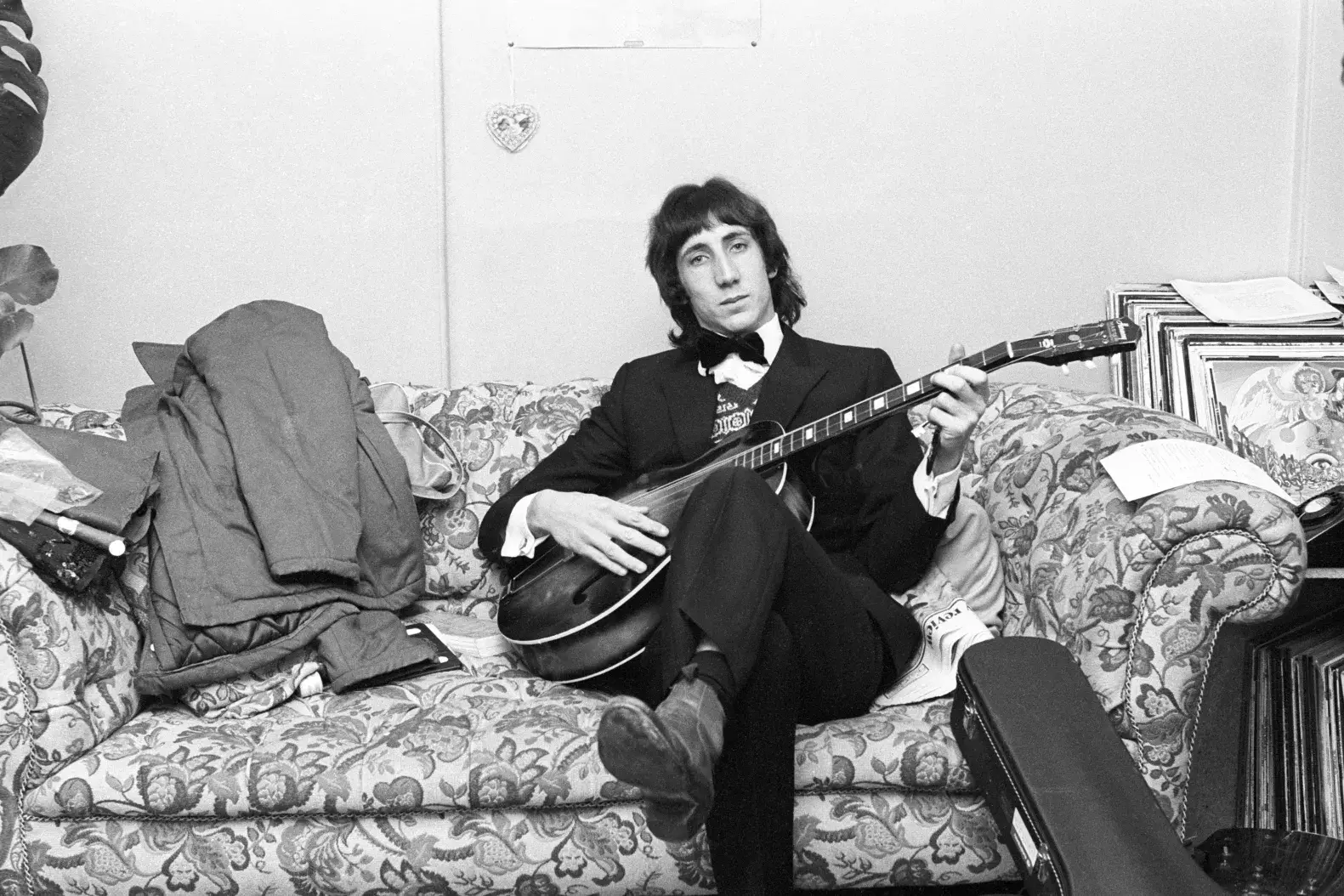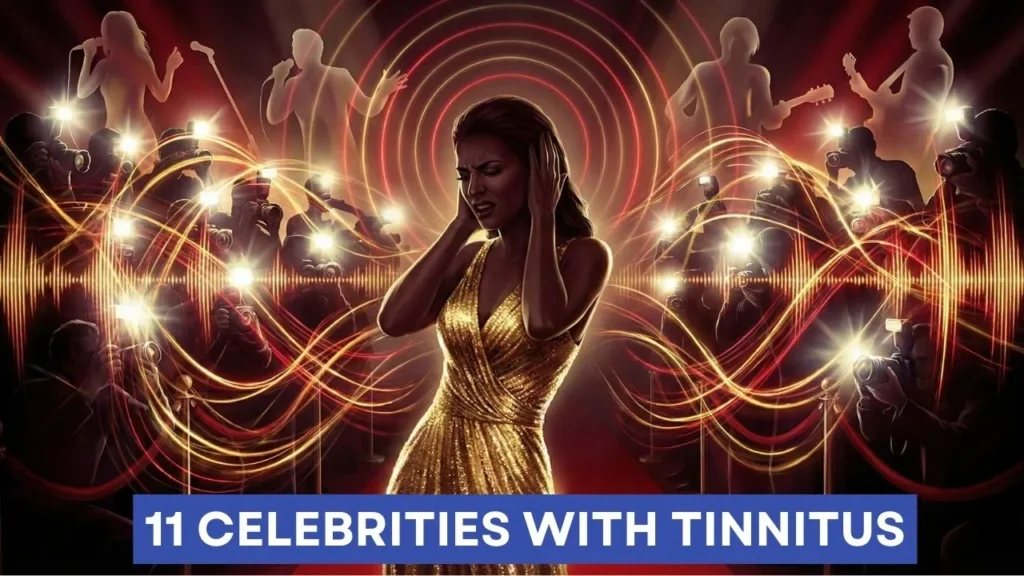There are a lot of things that even celebrities can’t stop, even though they have all the wealth, all the advanced medical advice at their fingertips. You won’t believe but there are plenty of well-known people, well-known celebrities with Tinnitus, struggling like us common people with this auditory health issue, but they are managing it.
Tinnitus is the sound you hear when the world is silent. Most people describe it as ringing, buzzing, or hissing in one or both ears. It’s not a disease. It’s a symptom that shows up when the ear or the brain’s sound pathways are under stress or damage.
Tinnitus affects millions of people worldwide. More than 740 million people experience tinnitus.1Global Prevalence and Incidence of Tinnitus, National Library of Medicine. That’s everyday workers, athletes, actors, and even global music icons.
Many celebrities discuss tinnitus because their careers rely on sound. Music, acting, stage performance, and live events expose them to very loud environments for long periods. When tinnitus shows up, they can’t hide it. Their honesty helps fans understand the condition better and reminds the public that hearing health matters.
Readers can learn a lot from their journeys. These stories show you can manage tinnitus with the right habits. They show that success is still possible even when the ringing never fully stops. Their experiences provide everyday people with clear, real-world examples of ear protection, stress management, lifestyle changes, and long-term adaptation.
What Is Tinnitus?
Tinnitus is the sound you hear when no real sound is present. People often notice ringing, buzzing, hissing, or a faint whistle in the ear. The sound can be soft or loud. It can come and go or stay all day.
Tinnitus happens when the hearing system is under stress.2Tinnitus: The Sound of Stress?, National Library of Medicine. The inner ear, the hearing nerve, and the brain work together to detect sound. When any part becomes damaged or irritated, the brain fills the silence with its own noise. That noise is tinnitus.
There are two main types of tinnitus:
Most people experience tinnitus at some point in life. Common triggers include:
Musicians and performers face a much higher risk. Concert stages, studio sessions, speakers, and amplifiers create sound levels that can damage the ear quickly. Repeated exposure without ear protection is the main reason many singers, drummers, and guitarists develop long-term tinnitus.
Now you know what tinnitus is, you can make sense of the symptoms and learn how to protect your hearing in daily life.
Symptoms and What Tinnitus Sounds Like
Tinnitus is different for everyone, but most people notice a sound that isn’t coming from the outside world. The noise can be constant or come in short bursts. The most common symptoms are:
These sounds can be in one ear or both ears. Some people hear them only in quiet rooms. Others hear them all day. Symptoms get worse when the ear or brain is under pressure. Common triggers are:
It gets worse at night because the environment is quieter. With no outside sound, the brain focuses on the internal noise. Many myths confuse people who first notice tinnitus. Here are simple facts to cut through the noise:
- Myth: Tinnitus can’t be cured.
- Fact: While there is no magic pill, tinnitus can be managed very well. Many people get to a point where the sound becomes less noticeable or stops bothering them.
- Myth: Tinnitus means hearing loss is inevitable.
- Fact: Some people have tinnitus with no measurable hearing loss.
- Myth: Nothing works.
- Fact: Sound therapy, stress control, lifestyle changes, and hearing support can reduce symptoms and improve life.
Now that you know what tinnitus sounds like, you can take the next step towards practical management and long-term relief.
Celebrities Who Have Tinnitus
Many well-known artists live with tinnitus and still perform at the highest level. Their stories show how hearing protection, lifestyle changes, and discipline can keep careers strong.
1)- Chris Martin
Chris Martin developed tinnitus in his early twenties after long rehearsals and live shows without ear protection. Loud instruments and studio sessions stressed his ears until the ringing became constant.
He manages it with custom earplugs, controlled volume levels, and regular hearing checks. He also promotes hearing safety to younger musicians. Coldplay continued to grow worldwide, which shows that smart protection can save a music career.
2)- Will.i.am

Will.i.am has spoken openly about a constant high-pitched tone in his ears. Years of producing music and touring exposed him to intense sound levels, which triggered his tinnitus.
He manages symptoms with sound control in the studio, stress reduction, and masking sounds at night. These steps help him stay focused and creative. His career as a producer, performer, and entrepreneur stayed strong despite the ringing.
3)- Bono

Bono developed tinnitus early in U2’s career due to repeated exposure to loud stages and amplifiers. Touring without hearing protection made the sound damage worse.
He now performs with in-ear monitors and keeps strict volume control. Breaks during tours help his ears recover. U2 continues to sell out stadiums, showing that managing tinnitus can support a long career.
4)- Barbra Streisand

Barbra Streisand has dealt with tinnitus since childhood. Her symptoms began after a sudden sound trauma when she was nine.
She manages the condition by avoiding loud environments and using stress control techniques. She stays focused on vocal performance rather than high noise exposure. Her long and successful career proves that early tinnitus does not stop artistic growth.
5)- Pete Townshend

Pete Townshend of The Who is one of the most famous cases in rock. Decades of explosive stage volume and powerful amplifiers caused severe tinnitus and hearing damage.
He manages it with special in-ear systems and support from hearing specialists. He also limits exposure to high-volume environments. Townshend still writes and records music, and his story continues to warn new musicians about safe sound levels.
6)- Eric Clapton

Eric Clapton developed tinnitus after years of concerts filled with loud amplifiers and electric guitar exposure. He manages symptoms with noise control, high-quality ear monitors, and reduced touring. He also uses noise-cancelling tools during studio work.
Clapton remains one of the most respected guitarists in the world and continues to record music.
7)- Ludwig van Beethoven
Beethoven experienced tinnitus before he lost his hearing completely. His symptoms began in his late twenties and grew stronger over the years.
He managed the condition by relying on vibration-based techniques, communication notebooks, and deep musical memory. His internal sense of sound guided his compositions. Despite tinnitus and total hearing loss, he created some of the most important music ever written.
8)- Phil Collins

Phil Collins developed tinnitus after years of performing with loud drums and stage monitors. Constant exposure during tours stressed his hearing.
He manages it with hearing protection and reduced live performances. He also takes long breaks to prevent further damage. Collins continued writing and recording music even after cutting back on touring.
9)- Huey Lewis

Huey Lewis developed severe tinnitus after inner ear damage linked to a disorder affecting hearing balance. The ringing and distortion made live performance very difficult.
He manages symptoms with rest, ear protection, and medical guidance. Although he paused touring, he still works on new music projects. His story highlights the impact of early diagnosis.
10)- Liam Gallagher

Liam Gallagher developed tinnitus during his Oasis years due to loud concerts and studio sessions.
He manages it with ear protection and controlled studio volume. He also stays vocal-focused rather than guitar-driven during rehearsals. Gallagher continues to sell out arenas as a solo artist.
11)- William Shatner
William Shatner developed tinnitus after a loud explosion on a film set. The sudden trauma caused long-lasting ringing. He manages symptoms with sound therapy and relaxation techniques. He often speaks about tinnitus to raise awareness.
Shatner remained active in acting, writing, and speaking despite the condition.
Lessons We Can All Take From Celebrities With Tinnitus
Celebrities living with tinnitus swear by a few simple habits that can be used by anyone to safeguard their hearing, reduce the strain on their ears, and prevent things from getting even worse.
- Protect Your Hearing: Loud noises are the fastest way to damage your hearing, and it’s not just concerts or nightclubs that can cause the damage either. Traffic pollution, the din of a factory, and even the gym speakers can all push sound levels right past the safe limit. But by using some good quality earplugs, you can take the risk right down and help keep your ears stable.
- Give Your Ears a Break: Your inner ear needs a bit of quiet time to recover after being exposed to loud noises. So after that concert or heavy music session, take the rest of the day off from the headphones, heavy bass, and noisy places – your ears will thank you.
- The DIY Solution from the MusicWorld: In-ear monitors are a lifesaver for musicians on stage, but at home, you don’t need to break the bank on one of these to look after your hearing. High-quality earplugs are a more affordable option; they cut the sound levels back but still let you enjoy the music without having to worry about your hearing.
- Learn to React to Tinnitus in a Different Way: Stress plays a big part in making tinnitus worse, and getting worked up over it certainly doesn’t help. By changing your mindset and treating the tinnitus as something that is not a threat, over time, it will start to feel less intense.
- Get Some Professional Help When You Need It: If you are experiencing tinnitus, it’s a good idea to get checked out by an ENT doctor or an audiologist. They can help identify any reversible causes that might be contributing to the problem, such as earwax, infections, or blood pressure changes, as well as provide you with some sound therapy, hearing aids, or even custom-made masking tools.

These simple habits are the same ones that celebrities have been using to make their careers last, and by following the same path, a regular person can get the same benefits – all it takes is a bit of looking after your ears and some self-discipline to get the best out of them.
Practical Ways Anyone Can Manage Tinnitus
Tinnitus can be a real challenge – but the good news is that with some simple daily habits, most people can learn to manage Tinnitus. These steps not only help tone down the noise but also reduce stress and set you up for long-term relief.
These strategies work for everyday people and for celebrities. Consistent habits help the brain adapt, lower stress, and make the sound easier to live with.
Final Thoughts
Tinnitus can feel scary, but it is manageable for most people. The sound may not disappear, but the right habits can lower its impact and help the brain adapt.
Success is still possible with tinnitus. Many celebrities continue to perform, record, act, and create while the ringing stays in the background. Their stories show that long-term adaptation is real. The brain learns to filter the noise when you protect your ears and stay consistent with healthy routines.
These examples also offer clear guidance. They show the power of hearing protection, sound control, stress management, and professional support. They prove that tinnitus does not have to limit your goals.
Take action early and stay proactive. Protect your ears, check for simple causes, use masking when needed, and lean on expert support. Small steps lead to steady relief and help you regain control of your daily life.
Scientific References
- 1Global Prevalence and Incidence of Tinnitus, National Library of Medicine.
- 2Tinnitus: The Sound of Stress?, National Library of Medicine.


Recent Posts